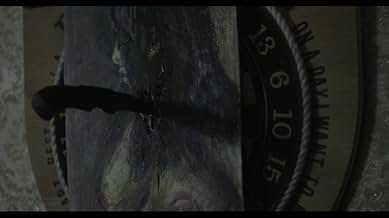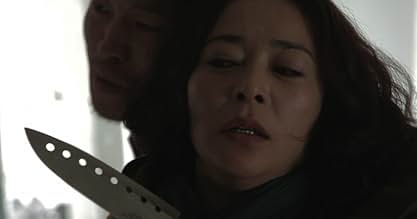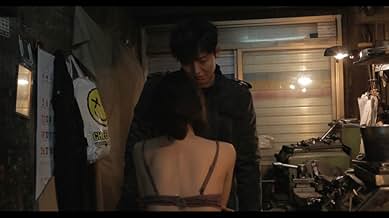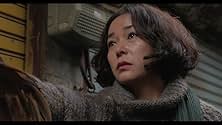AVALIAÇÃO DA IMDb
7,1/10
16 mil
SUA AVALIAÇÃO
Um agiota é forçado a reconsiderar seu estilo de vida violento após a chegada de uma mulher misteriosa que afirma ser sua mãe há muito perdida.Um agiota é forçado a reconsiderar seu estilo de vida violento após a chegada de uma mulher misteriosa que afirma ser sua mãe há muito perdida.Um agiota é forçado a reconsiderar seu estilo de vida violento após a chegada de uma mulher misteriosa que afirma ser sua mãe há muito perdida.
- Direção
- Roteirista
- Artistas
- Prêmios
- 25 vitórias e 30 indicações no total
Lee Jung-Jin
- Gang-Do
- (as Jeong-jin Lee)
Woo Ki-hong
- Hoon-chul
- (as Ki-Hong Woo)
Cho Jae-ryong
- Tae-seung
- (as Jae-ryong Cho)
Heo Joon-seok
- Suicidal Man
- (as Jun-seok Heo)
Kwon Yul
- Machinist with the Guitar
- (as Se-in Kwon)
Yu Ha-bok
- Container man
- (as Ha-bok Yu)
Avaliações em destaque
- Review originally posted at The Frame Loop. Visit www.theframeloop.com -
Even before the first image of an ominously hanging, rusty hook, Pieta comes to CPH PIX Film Festival with a great deal of infamy. The latest from South Korean, art-house provocateur Kim Ki Duk (3-Iron, The Isle) this unnerving revenge drama wowed last year's Venice Film Festival jury so much that it went on to beat Paul Thomas Anderson's The Master to the coveted Golden Lion award. Is it a better film than that aptly titled PTA project? Absolutely not. Is Pieta a gritty, harrowing and wholly engrossing exercise in cinematic tolerance? You're damn right it is.
Li Jung-Jin stars as Kang-Do, the merciless henchman to a crooked Seoul loan shark. Living in a threadbare apartment, with a diet consisting of half-cooked meat, he scuttles across the city, ruffling up people's feathers and making sure they pay up their debts, or else suffer the brutal consequences. His lonesome, pitiful existence is transformed by the arrival of Mi-Sun (Jo Min-Soo), an elderly woman claiming to be his estranged mother. Seeking repentance and the love of the inhumane monster she birthed and abandoned, the disbelieving Kang-Do puts her through a slew of horrific tests that will prove their bloodline, from eating dismembered body parts, to unsolicited incest. Boundaries are crossed, taboos busted open, and a repugnant relationship ensues.
Despite the industrial slum setting and the subtext of tooth/limbless capitalism, Pieta conforms to a typical Greek tragedy plot line. With each revelation more traumatic and sickening than the last, Kim tells the story with brute emotional force and savagery, without ever resorting to the ultra-violence made so common in South Korean cinema from the likes of Park Chan-Wook and The Vengeance Trilogy. While Jo Young-Jik's curious hand-held cinematography may look away from the most distressing of graphic acts, the pain lingers on the screen through Li and Jo's fantastic, expressionistic acting. The pair have a terse, inflammatory chemistry which is so enthralling that the mother-son relationship is all the more sickening.
Perhaps the film's success in Europe isn't all that surprising. Tackling the cruel storyline through emotional heft – without the archetypal glossy production values of the region - Pieta could be mistaken for a Lars von Trier or Gaspar Noé project. With a sublime first act, Kim gets lost in the knotty narrative he has laid out before him, and ties everything up in a stirring denouement that brings some genuine heart to the otherwise pitiful portrait of dog-eat-dog, Seoul city-living.
In that brilliant opening third, Mi-Sun turns to Kang-Do to denounce money as the 'beginning and the end of all things: love, honour, violence, fury, hatred, jealousy, revenge, death.' Unsavoury topics abound, Kim Ki-Duk combats them all with severe conviction in Pieta. If you can stomach such callousness, then this is diatribe is well worth a watch.
- Review originally posted at The Frame Loop. Visit www.theframeloop.com -
The very last scene of this movie would linger in your mind for quite a while. In Kim Ki-Duk's movies, you may find holes in storyline or awkwardness in acting. However, Kim never fails to give stunning visual images via which you could fly to another world in an instant.
In my opinion, elaborate scenarios or experienced actors/actresses are not prerequisite for Kim's movies. His movies are like abstract paintings or poems. They are not supposed to be realistic and are essentially vague in meaning. Do not expect his movies to be kind to give enough explanations. You should find their meaning with your own imagination.
At the expense of being confused and tortured with puzzling metaphors, you could reach the land of poetic beauty and religious purification. This moment of transcendence is what I expect from art, any kind including movie.
In my opinion, elaborate scenarios or experienced actors/actresses are not prerequisite for Kim's movies. His movies are like abstract paintings or poems. They are not supposed to be realistic and are essentially vague in meaning. Do not expect his movies to be kind to give enough explanations. You should find their meaning with your own imagination.
At the expense of being confused and tortured with puzzling metaphors, you could reach the land of poetic beauty and religious purification. This moment of transcendence is what I expect from art, any kind including movie.
Pieta is the story of revenge in a most brutal way possible by giving one's own life, a story of mother's love for his son. Story tells us the extreme measures taken by a mother to take the revenge from a non-human brutal loan shark.
Jung-Jin Lee is living a lonely life whose sole purpose is to recover the loan from other people by making them cripple and claiming their insurance money. In doing so he has become so cold inside that he feels nothing and know no pain. Brutality is the everyday life matter.
Enters a woman stirring everything by claiming that she is his mother. she make him feel love, make him angry and make him feel pain just to take the revenge of her son. And when Jung-Jin starts to feel human again, she inflicted the deep scar into his soul by giving her own life.
Movie is full of disturbing content and makes for a haunting viewing. I am a fan of south Korean cinema and this movie takes the love affair to another level.
8/10
Jung-Jin Lee is living a lonely life whose sole purpose is to recover the loan from other people by making them cripple and claiming their insurance money. In doing so he has become so cold inside that he feels nothing and know no pain. Brutality is the everyday life matter.
Enters a woman stirring everything by claiming that she is his mother. she make him feel love, make him angry and make him feel pain just to take the revenge of her son. And when Jung-Jin starts to feel human again, she inflicted the deep scar into his soul by giving her own life.
Movie is full of disturbing content and makes for a haunting viewing. I am a fan of south Korean cinema and this movie takes the love affair to another level.
8/10
Directed by Kim Ki-duk
Pieta is director Kim Ki-duk's eighteenth movie. When this fact appeared on the screen, a spontaneous applause erupted. Hugely under-appreciated at home, Kim Ki-duk is well-known beyond the borders of his country South-Korea. He does not conform to any rules, doesn't avoid sensitive subjects, and shows the harshness of life without any scruples, political, humanistic and in a very physical confronting approach. It is true that his films are usually not an easy watch; they certainly do not conform to idea that film equals entertainment. The free thinking soul will see that Kim Ki-duk's movies are not made to shock the audience just for the sake of it, but to show the thoughts of a brave artist, who exhibits a rare vulnerability and a frightening honesty in his approach to his subjects.
Actress Cho Min-soo who portrays the character Mi-son in the movie declares during the press conference: "His films are eyes to reality." Apparently she and Lee Jung-Jin, who brilliantly plays main character Gang-Do, barely knew who Kim Ki-duk was when they were asked to play the parts. They tell the press that during the process of making the movie they learned to act in a completely different way.
Made with a budget that is just a fraction of Korean film budgets these days, outsider Pieta entices the jury and the public, and makes a far more lasting impression than other more obvious candidates like "To the Wonder,""At any price" and "Fill the void." Even though malicious rumors say that the jury wanted to award "The Master" all the big prizes, Kim's film is rightfully the recipient of the Golden Lion. Accepting the prize, Kim thanked the actors, staff, film festival officials and Italian fans before bursting into a traditional Korean song.
The story of the film is about lone wolf, self-absorbed: masturbating, crazy moralless man who lends money to desperate workers of the industrial slum of Cheonggyecheon. He charges ten times the borrowed sum in interest. If his clients don't pay up, Gang-do cripples them, taking the insurance payments on their injuries to make up for the difference. His character is a metaphor for extreme capitalism. Kim commented: "...but not the money itself, you can change the face of money. Money is the third character."
Then a women shows up at his doorstep, claiming to be the mother who abandoned him as a baby. He tests her in some gruesome ways, before he acknowledges her presence and even begins to show signs of affection towards her. Mi-son also proves herself to him by being just as ruthless as him. They form a frightful but also strangely intriguing duo. The grim story finds some more breathing space for the audience towards the end, but a bitter aftertaste remains.
What makes Kim Ki-duk an excellent storyteller is that most of the graphic cruelty is not shown, but actually takes place in the viewer's imagination. He is able to show real life images that can represent abstract ideas. He can make an audience relate to his characters even though they are immoral and almost heartless human beings, doing this with so much ease is remarkable. It is a rare quality to be able to find beauty in the most harsh places and to somehow convey this strange beauty to the screen. To make you believe in the story, without realizing it is perhaps an absurd one. And maybe most important: to make the viewer emotionally gripped, while talking about universal human issues, emotions and ideas even though there are cultural differences that separate audience and filmmaker. Kim Ki-duk: "(Pieta is) an embrace to the whole of humanity. The movie is dedicated to humankind."
Pieta is director Kim Ki-duk's eighteenth movie. When this fact appeared on the screen, a spontaneous applause erupted. Hugely under-appreciated at home, Kim Ki-duk is well-known beyond the borders of his country South-Korea. He does not conform to any rules, doesn't avoid sensitive subjects, and shows the harshness of life without any scruples, political, humanistic and in a very physical confronting approach. It is true that his films are usually not an easy watch; they certainly do not conform to idea that film equals entertainment. The free thinking soul will see that Kim Ki-duk's movies are not made to shock the audience just for the sake of it, but to show the thoughts of a brave artist, who exhibits a rare vulnerability and a frightening honesty in his approach to his subjects.
Actress Cho Min-soo who portrays the character Mi-son in the movie declares during the press conference: "His films are eyes to reality." Apparently she and Lee Jung-Jin, who brilliantly plays main character Gang-Do, barely knew who Kim Ki-duk was when they were asked to play the parts. They tell the press that during the process of making the movie they learned to act in a completely different way.
Made with a budget that is just a fraction of Korean film budgets these days, outsider Pieta entices the jury and the public, and makes a far more lasting impression than other more obvious candidates like "To the Wonder,""At any price" and "Fill the void." Even though malicious rumors say that the jury wanted to award "The Master" all the big prizes, Kim's film is rightfully the recipient of the Golden Lion. Accepting the prize, Kim thanked the actors, staff, film festival officials and Italian fans before bursting into a traditional Korean song.
The story of the film is about lone wolf, self-absorbed: masturbating, crazy moralless man who lends money to desperate workers of the industrial slum of Cheonggyecheon. He charges ten times the borrowed sum in interest. If his clients don't pay up, Gang-do cripples them, taking the insurance payments on their injuries to make up for the difference. His character is a metaphor for extreme capitalism. Kim commented: "...but not the money itself, you can change the face of money. Money is the third character."
Then a women shows up at his doorstep, claiming to be the mother who abandoned him as a baby. He tests her in some gruesome ways, before he acknowledges her presence and even begins to show signs of affection towards her. Mi-son also proves herself to him by being just as ruthless as him. They form a frightful but also strangely intriguing duo. The grim story finds some more breathing space for the audience towards the end, but a bitter aftertaste remains.
What makes Kim Ki-duk an excellent storyteller is that most of the graphic cruelty is not shown, but actually takes place in the viewer's imagination. He is able to show real life images that can represent abstract ideas. He can make an audience relate to his characters even though they are immoral and almost heartless human beings, doing this with so much ease is remarkable. It is a rare quality to be able to find beauty in the most harsh places and to somehow convey this strange beauty to the screen. To make you believe in the story, without realizing it is perhaps an absurd one. And maybe most important: to make the viewer emotionally gripped, while talking about universal human issues, emotions and ideas even though there are cultural differences that separate audience and filmmaker. Kim Ki-duk: "(Pieta is) an embrace to the whole of humanity. The movie is dedicated to humankind."
The 18th feature film written & directed by Korean cinema's most notorious filmmaker, Pietà tells the story of a sadistic loan shark who ends up crippling people for not paying their debts, which after added interest is 10 times the amount they borrowed. Torturing with no feelings, his life takes a changing course when a middle-aged woman claiming to be his long lost mother comes into his life out of nowhere.
The film has all the disturbing elements one expects from Kim Ki-duk and although the first half has no easy-to-digest moments, the second half plays out very well to end on a satisfying, even rewarding, note. Cinematography reflects the appalling nature of the subject matter while editing presents a well-sought balance. The performances are pretty impressive from its two leads & the rest of filmmaking aspects are finely executed as well.
On an overall scale, Pietà is a highly tragic story of love, loss, revenge & redemption that has much more to offer than just disgust its viewers. Sure, Kim Ki-duk takes extreme pleasure in making his audience flinch but he also backs it up with enough justifications for the violence in his films. Shocking, unnerving, pitiful, haunting & infused with Christian symbolisms, Pietà is an unsettling psychological study of a mother-son relationship that also presents a fascinating take on what famously is Korean cinema's favourite genre.
The film has all the disturbing elements one expects from Kim Ki-duk and although the first half has no easy-to-digest moments, the second half plays out very well to end on a satisfying, even rewarding, note. Cinematography reflects the appalling nature of the subject matter while editing presents a well-sought balance. The performances are pretty impressive from its two leads & the rest of filmmaking aspects are finely executed as well.
On an overall scale, Pietà is a highly tragic story of love, loss, revenge & redemption that has much more to offer than just disgust its viewers. Sure, Kim Ki-duk takes extreme pleasure in making his audience flinch but he also backs it up with enough justifications for the violence in his films. Shocking, unnerving, pitiful, haunting & infused with Christian symbolisms, Pietà is an unsettling psychological study of a mother-son relationship that also presents a fascinating take on what famously is Korean cinema's favourite genre.
Você sabia?
- CuriosidadesShot digitally on two Canon EOS 5D Mark II DSLR cameras. The director operated one of the cameras himself.
- ConexõesFeatured in At the Movies: Venice Film Festival 2012 (2012)
Principais escolhas
Faça login para avaliar e ver a lista de recomendações personalizadas
- How long is Pieta?Fornecido pela Alexa
Detalhes
Bilheteria
- Orçamento
- € 103.000 (estimativa)
- Faturamento bruto nos EUA e Canadá
- US$ 22.080
- Fim de semana de estreia nos EUA e Canadá
- US$ 6.222
- 19 de mai. de 2013
- Faturamento bruto mundial
- US$ 6.616.296
- Tempo de duração1 hora 43 minutos
- Cor
- Mixagem de som
- Proporção
- 1.85 : 1
Contribua para esta página
Sugerir uma alteração ou adicionar conteúdo ausente






























